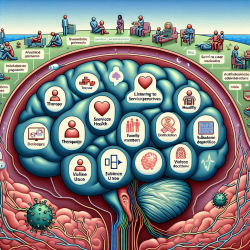Introduction
As practitioners in the field of mental health and substance use, understanding the perspectives of service users and their families is crucial for improving service delivery and outcomes. A recent qualitative study titled "Service user and family member perspectives on services for mental health, substance use/addiction, and violence: a qualitative study of their goals, experiences and recommendations" offers valuable insights that can enhance practitioner skills and service effectiveness.
Key Findings from the Study
The study involved structured interviews with 73 service users and 41 family members across two Ontario communities. Participants shared their goals, experiences, and recommendations for improving mental health, substance use, and violence-related services. The findings highlighted several key areas for improvement:
- Respectful and Nonjudgmental Services: Participants emphasized the need for services that are respectful, nonjudgmental, and supportive. They stressed the importance of feeling 'normal' and reducing stigma through education.
- Accessibility and Funding: There is a need for accessible, varied, and publicly funded services to meet individual needs and address equity concerns at a systemic level.
- Coordinated and Holistic Care: Services should be coordinated, holistic, and inclusive of family members who often support service users.
Implications for Practitioners
Practitioners can leverage these findings to enhance their service delivery in several ways:
- Emphasize Respect and Understanding: Practitioners should prioritize respectful interactions and strive to understand the unique experiences of service users. This includes acknowledging their expertise regarding their own health and providing a supportive environment.
- Improve Accessibility: Efforts should be made to ensure services are accessible to all individuals, regardless of their location or financial situation. This may involve advocating for more publicly funded services and reducing wait times.
- Coordinate Care: Practitioners should work collaboratively with other service providers to offer coordinated and holistic care. This includes addressing co-occurring issues and involving family members in the care process.
Encouraging Further Research
While the study provides valuable insights, it also highlights the need for further research. Practitioners are encouraged to explore additional qualitative research to better understand the diverse experiences of service users and their families. This can lead to more effective and personalized care strategies.
Conclusion
By implementing the recommendations from this study, practitioners can enhance their skills and improve outcomes for individuals facing mental health, substance use, and violence-related challenges. Emphasizing respect, accessibility, and coordinated care will contribute to a more effective and supportive service environment.
To read the original research paper, please follow this link: Service user and family member perspectives on services for mental health, substance use/addiction, and violence: a qualitative study of their goals, experiences and recommendations.










